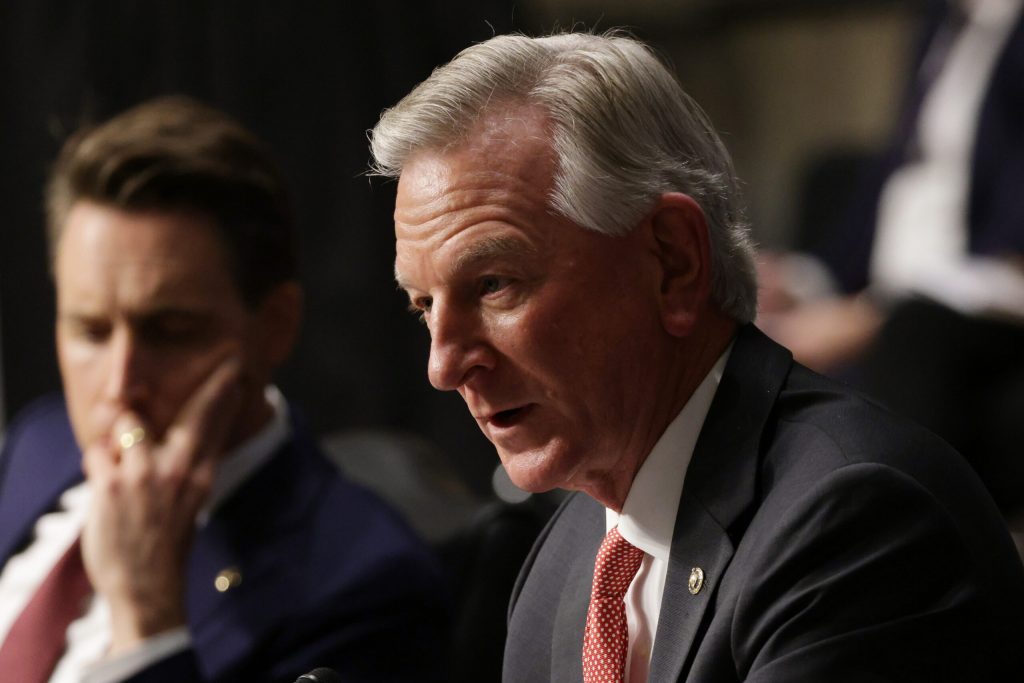U.S. Senate confirms a military nominee, the first since Tuberville blockade began

U.S. Sen. Tommy Tuberville, R-Alabama, speaks during a hearing before the Senate Armed Services Committee on Sept. 28, 2021 in Washington, D.C. Photo by Alex Wong/Getty Images
The U.S. Senate confirmed a nominee for a high-ranking military post Wednesday night and advanced another, the first votes on military nominations or promotions since Alabama Republican Tommy Tuberville started blocking them seven months ago to protest Defense Department abortion policies.
Tuberville did not object to Senate Majority Leader Chuck Schumer, a New York Democrat, setting up votes to end debate and confirm the nomination of Gen. Charles Q. Brown to be chair of the Joint Chiefs of Staff. The Senate voted to confirm Brown, 83-11. Tuberville and 10 other Republicans voted no.
But the process was a lengthy one. The chamber voted earlier Wednesday to end debate on the confirmation, a procedural step that can be skipped by unanimous consent. Tuberville has for months denied that consent for votes on all military nominees.
“We’ve been sitting around here for 215 days waiting for them to do something,” Tuberville told reporters Wednesday. “They finally figured out I wasn’t going to give in.”
Tuberville added his position was still to force singular votes on military nominees through regular order that requires a cloture vote.
Schumer filed cloture — which, if agreed to, brings an end to debate — on three nominations: Brown’s, Gen. Randy George to be Army chief of staff and Gen. Eric M. Smith to be the commandant of the Marine Corps.
Following the vote to confirm Brown, the Senate voted, 92-1, to end debate on George to be Army chief of staff, setting up a vote on his confirmation Thursday. The Senate did not consider Smith’s nomination Wednesday.
Schumer said he expected time agreements to allow votes on the confirmations before week’s end, but would keep the chamber in session through Saturday in the absence of such an agreement.
Tuberville told reporters he wouldn’t object to collapsing the time requirements.
Tuberville objects to the Pentagon policy that allows leave and travel allowances for service members seeking non-covered reproductive care, including traveling to states where abortion services remain available. He has blocked a growing list of nominees from Senate approval in protest of the policy, which he says violates the law.
“Let’s do them one at a time or change the policy,” Tuberville said.
Military nominations and promotions that require Senate approval are generally handled in batches and without much friction — a necessity in a chamber that often runs on the unanimous consent of its members.
Tuberville’s insistence on a time-consuming process for each confirmation is meant to force Schumer to either abandon military confirmation votes or grind other Senate business to a halt — which at the moment includes avoiding a government shutdown, authorizing Defense Department programs, reauthorizing the Federal Aviation Administration and providing disaster aid.
“They’re going to run out of floor time and we’ve got a lot going on up here,” Tuberville said Wednesday. “This whole thing is about the policy, it’s not about confirming people.”
‘Our military deserves better’
Tuberville’s approach has drawn criticism from many sources, including veterans groups, the White House and members of both parties in Congress.
In a floor speech announcing votes would proceed, Schumer blasted Alabama’s senior senator, saying his campaign would “change the nature of our non-political military.”
“Instead of just getting out of the way and allowing the Senate to approve the promotions that these decorated military officers deserve, the senator from Alabama, unfortunately and wrongly, is using them as pawns,” Schumer said.
“What Sen. Tuberville is doing will set the military and the Senate down a path to vote on every single military promotion,” he added. “It will make every single military officer’s promotion subject to the political whims of the Senate and even of one senator.”
Schumer also dismissed Tuberville’s efforts as ultimately fruitless. The three nominations will be approved by overwhelming majorities this week, Schumer said, while the abortion policy will remain in place. The only consequences of Tuberville’s holds are a list of hundreds of pending nominations and a deteriorated culture in the Senate, he said.
Schumer implored Republicans not to allow this process to become the norm, saying it would “grind this body to a halt.”
“It is my hope, indeed it’s my prayer, that we find a better way,” Schumer said. “Our military deserves better. We cannot allow Sen. Tuberville to set the Senate on a path that no senator wants to travel.”
GET THE MORNING HEADLINES DELIVERED TO YOUR INBOX
The post U.S. Senate confirms a military nominee, the first since Tuberville blockade began appeared first on Georgia Recorder.



